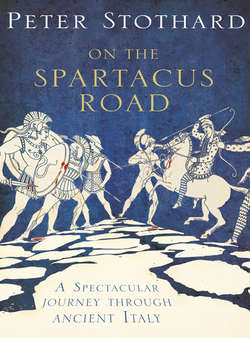Читать книгу On the Spartacus Road: A Spectacular Journey through Ancient Italy - Peter Stothard - Страница 5
Prologue
ОглавлениеIn the final century of the first Roman Republic an army of slaves brought a peculiar terror to the people of Italy. Its leaders were gladiators. Its purpose was incomprehensible. Its success was something no one had ever known. Never before had the world’s greatest state been threatened from the lowest places that its citizens could imagine, from inside its own kitchens, laundries, mines, fields and theatres. Never again, the victors said when Spartacus was dead and his war was over.
The Spartacus Road is the route along which the slave army fought its Roman enemies between 73 and 71 BC. It is a road much travelled then and since by poets and philosophers, politicians and teachers, torturers and terrorisers of different times, those living today and those long ago dead, innovative thinkers about fear and death, some with truths to teach us, others whom we can try to forget. It stretches through 2,000 miles of Italian countryside and out into 2,000 years of world history. From Sicily to the Alps and from Paris to Hollywood, it has never wholly left the modern mind.
This book is a diary of a journey on that Spartacus Road. It is, in part, a journalist’s notebook because I have been a journalist—a newspaper reporter and editor—for most of my life. It is a classicist’s notebook, written with half-remembered classical books for company, because while reporting politics in our own time I have so often felt the beat of ancient feet. It is also the notebook of a grateful survivor: ten years ago I was given no chance of living to make this trip and, on the Spartacus Road, the memory of a fatal cancer and its fortuitous cure shone stronger, and stranger, than I ever thought it could.
Little of this book is as I thought it might be. It began as notes written night by night, on bar tables and brick walls, in the places where the Spartacus War was fought. It became a history of that war, the best that I could write, and the history of how I came to know anything about that war, other wars, and many other things.
Thanks are owed to Greek and Roman writers whom I thought I knew when I was young and know differently now. Returning to old books is like returning to old friends. They have changed, both the familiar characters studied at school and some of the less read ancients, a director of Roman water supplies, a historian who was a lovable tabloid hack, a pioneer writer on interior décor and on the apocalypse. Thanks too to some equally little-known twenty-first-century travellers, a pair of Koreans, an actor seeking centurion roles, a Pole selling DVDs and a bibulous priest.
The barest facts about Spartacus, like the road itself, are often hard to find. They disappear and reappear—in the landscape and in the memory of succeeding centuries. They have been twisted in the service of cinema, politics and art. There is Spartacus the romantic gladiator from Thrace, the fighter for freedom, the man who lives on in the memory of emulators; and there is Spartacus the terrorist and threat to life, the one who survives in others’ fears. There is the hidden man and the man of the Spectacular, the word which appeared on the first page of my first notes and is left still in the subtitle of this book, the Romans’ own name for the theatrical games and aesthetic of death that so powerfully defined both their lives and our memories of them.
